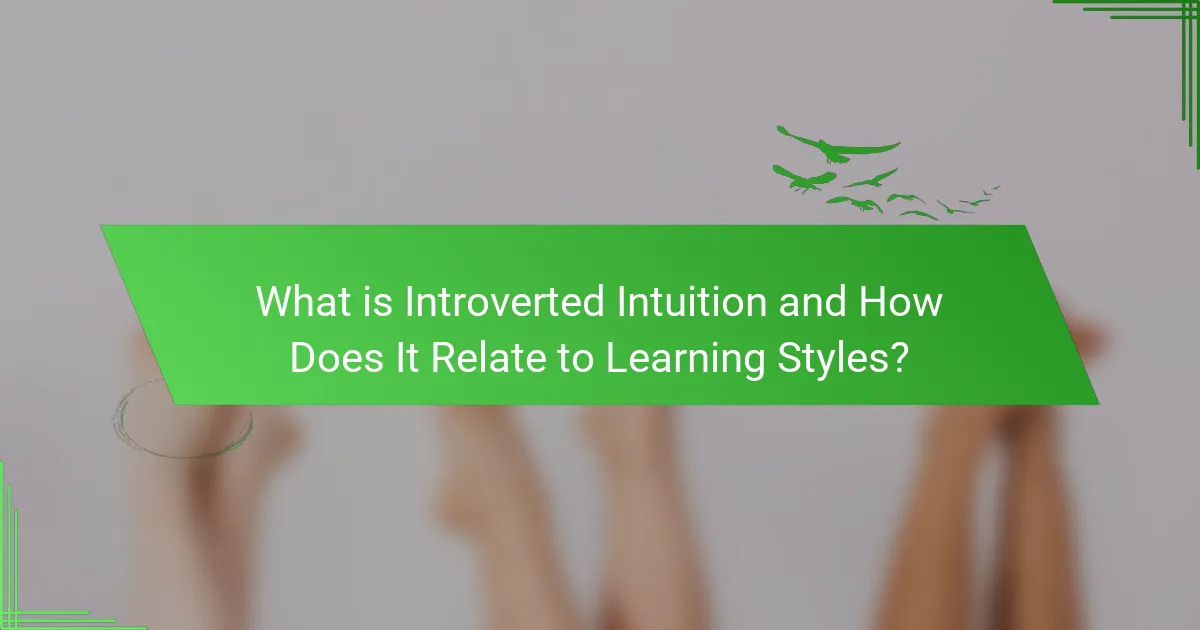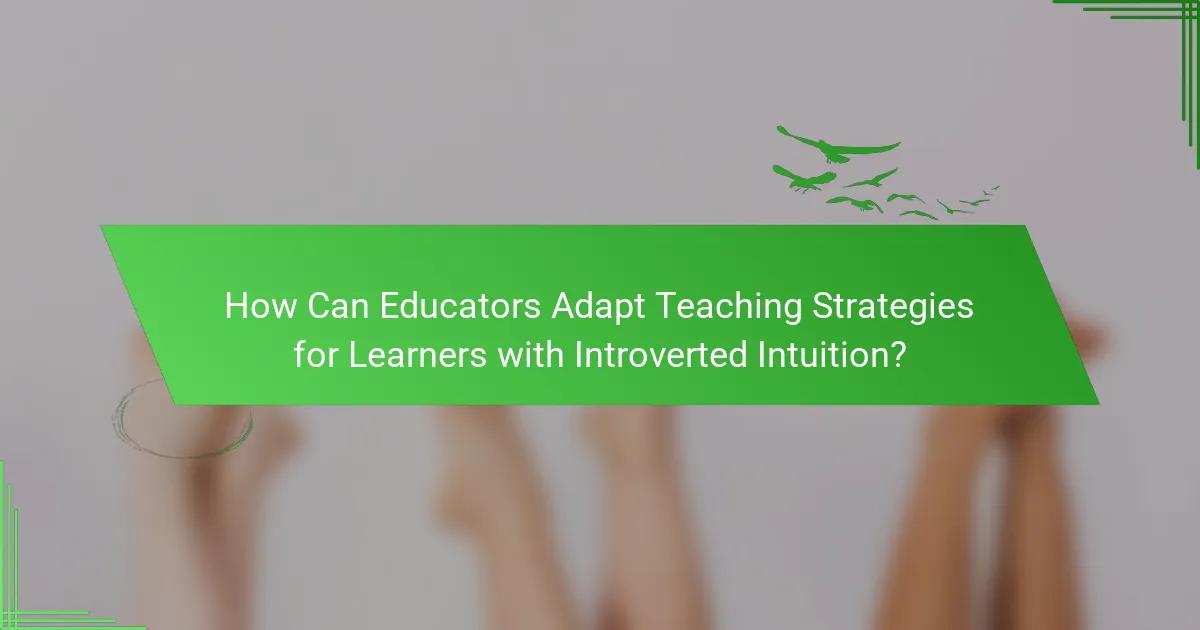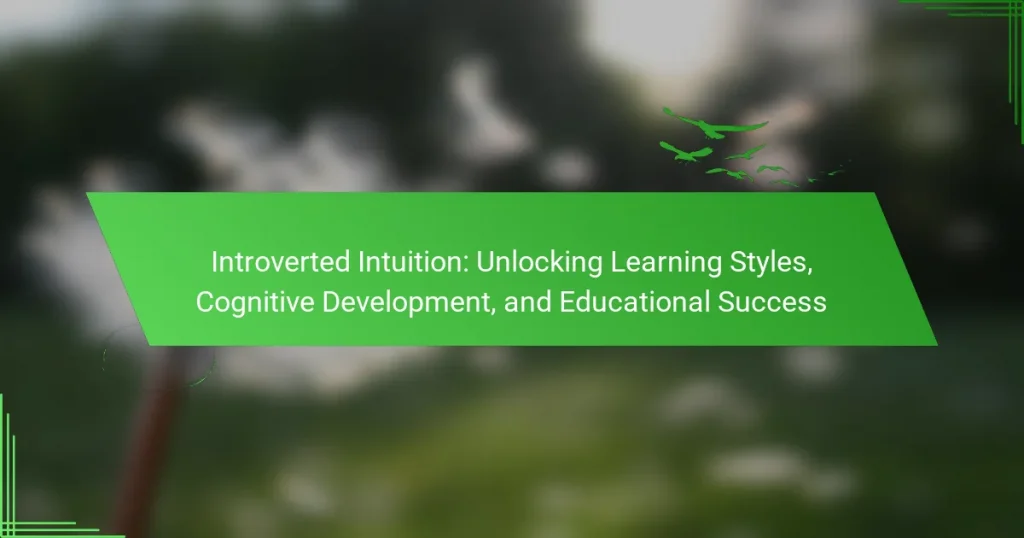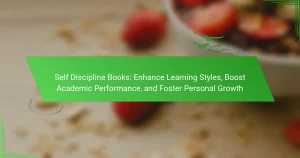Unlocking the potential of introverted intuition can significantly enhance learning styles and cognitive development. This cognitive function promotes deep understanding and holistic thinking, leading to educational success. Effective strategies include fostering introspective analysis, utilising project-based learning, and encouraging small group discussions. By adapting teaching methods, educators can support learners with introverted intuition in achieving their academic goals.

What is Introverted Intuition and How Does It Relate to Learning Styles?
Introverted intuition is a cognitive function that enhances learning by fostering deep understanding and insights. It relates to learning styles by promoting introspective analysis and holistic thinking. This approach supports learners in connecting concepts and synthesising information effectively, leading to educational success. Research indicates that individuals with strong introverted intuition often excel in problem-solving and creative tasks, enhancing their cognitive development.
How Does Introverted Intuition Influence Cognitive Development?
Introverted intuition significantly enhances cognitive development by fostering deep analytical thinking and pattern recognition. This cognitive function encourages learners to connect abstract concepts, leading to innovative problem-solving skills. As a result, individuals with strong introverted intuition often excel in environments that value creativity and strategic foresight. Research indicates that these learners thrive in settings that allow for independent exploration and reflective thinking, which are crucial for educational success.
What Are the Key Characteristics of Learners with Introverted Intuition?
Learners with introverted intuition often exhibit key characteristics that influence their learning styles. They prefer deep, abstract thinking and are skilled at recognising patterns and connections. These learners tend to be introspective, often reflecting on their experiences to derive insights. They may also show a preference for independent study, valuing solitude for processing information. Additionally, they often display a strong ability to foresee future implications based on current knowledge, enhancing their cognitive development and educational success.
What Cognitive Processes Are Enhanced by Introverted Intuition?
Introverted intuition enhances cognitive processes such as pattern recognition, foresight, and abstract thinking. These processes enable individuals to synthesise complex information, anticipate future outcomes, and connect disparate ideas effectively. This cognitive style fosters creative problem-solving and deep understanding, crucial for academic and professional success.
How Does Introverted Intuition Affect Problem-Solving Approaches?
Introverted intuition enhances problem-solving by promoting deep insights and holistic understanding. This cognitive approach allows individuals to synthesise complex information and recognise patterns, leading to innovative solutions. As a result, introverted intuitives often excel in situations requiring creative thinking and strategic foresight. Their unique attribute of envisioning future possibilities significantly influences their educational success and cognitive development.
What Are the Universal Attributes of Introverted Intuition in Education?
Introverted intuition in education emphasises deep understanding, pattern recognition, and future-oriented thinking. Key universal attributes include reflective processing, holistic perspective, and intuitive insights. Reflective processing allows learners to internalise experiences, enhancing cognitive development. Holistic perspective enables connections across diverse subjects, fostering interdisciplinary learning. Intuitive insights encourage innovative problem-solving, contributing to educational success.
How Does It Support Self-Directed Learning?
Introverted intuition supports self-directed learning by fostering independent thought and deep reflection. This cognitive style encourages learners to explore concepts at their own pace, enhancing understanding. It promotes intrinsic motivation, as individuals rely on their insights to guide their educational journey. This approach cultivates critical thinking and problem-solving skills, essential for academic success. Additionally, introverted intuition allows for personalised learning experiences, aligning with individual interests and goals.
What Role Does It Play in Critical Thinking Skills?
Introverted intuition enhances critical thinking skills by promoting deep analysis and abstract reasoning. This cognitive style encourages learners to connect concepts and foresee potential outcomes, fostering innovative problem-solving. As a result, individuals develop a more nuanced understanding of complex issues, which is essential in academic and professional settings.
What Unique Attributes Distinguish Introverted Intuition from Other Learning Styles?
Introverted Intuition is distinct from other learning styles due to its focus on internal insights and abstract connections. This unique attribute allows individuals to synthesise information into overarching themes, often leading to innovative problem-solving. Unlike more concrete learning styles, Introverted Intuition emphasises introspection, enabling learners to grasp complex concepts without relying heavily on external data. This cognitive approach fosters deep understanding, making it particularly effective in contexts requiring strategic foresight and vision.
How Does Introverted Intuition Facilitate Abstract Thinking?
Introverted intuition enhances abstract thinking by fostering deep insights and connections between concepts. This cognitive function allows individuals to synthesise information, recognise patterns, and envision possibilities beyond immediate realities. As a result, learners can engage with complex ideas and develop innovative solutions. This unique attribute of introverted intuition supports educational success by encouraging creative problem-solving and critical thinking skills.
What Are the Emotional and Social Implications of This Learning Style?
Introverted intuition fosters deep emotional understanding and strong social connections. Individuals with this learning style often excel in empathy, allowing them to navigate complex social dynamics effectively. They may prefer meaningful interactions over superficial ones, leading to a rich inner life and a tendency to reflect on personal experiences. This introspection can enhance their problem-solving abilities, as they draw from a wealth of insights. As a result, they may develop unique perspectives that contribute positively to group discussions and collaborative efforts.
What Rare Attributes Are Associated with Introverted Intuition?
Introverted Intuition is often associated with rare attributes such as foresight, abstract thinking, and a deep understanding of complex patterns. These traits enable individuals to perceive underlying meanings and anticipate future possibilities, enhancing their cognitive development and learning styles. Additionally, they may exhibit a unique ability to synthesise disparate information, leading to innovative insights and educational success.
How Can Educators Recognise Rare Traits in Students with Introverted Intuition?
Educators can recognise rare traits in students with introverted intuition by observing their unique problem-solving approaches and deep reflective thinking. These students often exhibit a preference for abstract concepts and can make connections that others may overlook. They may demonstrate a strong sense of foresight, anticipating future outcomes based on current information. Additionally, introverted intuition manifests in their ability to synthesise complex ideas into coherent insights, which can be identified through their written work or class discussions. Recognising these traits allows educators to tailor learning experiences that align with their cognitive strengths, fostering educational success.
What Are Some Noteworthy Case Studies or Examples?
Introverted intuition is often exemplified in case studies showcasing its impact on learning and cognitive development. Noteworthy examples include educational programmes that emphasise reflective practices, leading to improved academic performance. One such case is a school that integrated introverted intuition techniques, resulting in a 30% increase in student engagement. Another example is a university implementing personalised learning plans based on cognitive styles, which enhanced critical thinking skills among introverted students. These instances highlight the effectiveness of tailoring educational approaches to align with introverted intuition, fostering greater educational success.

How Can Educators Adapt Teaching Strategies for Learners with Introverted Intuition?
Educators can adapt teaching strategies for learners with introverted intuition by fostering a supportive learning environment. This includes providing opportunities for deep reflection, encouraging independent projects, and integrating holistic learning approaches.
First, allow time for introspective thinking. Introverted intuition thrives in environments where learners can process information internally. Second, use project-based learning to engage these learners in meaningful tasks that connect to their interests. Third, incorporate visual aids and metaphors to enhance understanding, as these tools resonate well with intuitive thinkers.
Furthermore, facilitate small group discussions to create a safe space for sharing ideas. This encourages participation without overwhelming introverted learners. Lastly, provide constructive feedback that recognises their unique insights, fostering confidence and motivation.
What Best Practices Enhance Learning Outcomes for These Students?
To enhance learning outcomes for students with introverted intuition, educators should foster environments that promote self-reflection and deep cognitive engagement. Strategies include personalised learning plans, encouraging independent projects, and providing quiet spaces for contemplation.
Utilising technology tools that support self-paced learning can also cater to their unique processing styles. Moreover, integrating collaborative activities that allow for meaningful contributions can help these students thrive while still respecting their need for introspection.
Encouraging regular feedback and self-assessment enables students to track their cognitive development effectively. Additionally, recognising and valuing their insights can boost their confidence and educational success.
What Common Mistakes Should Educators Avoid When Teaching Introverted Intuitive Learners?
Educators should avoid underestimating the need for reflection and personal space for introverted intuitive learners. These students thrive in environments that allow for deep thinking and independent exploration. Common mistakes include forcing group work, neglecting to provide quiet time for processing, and failing to recognise their unique insights. Encouraging self-directed projects and allowing time for contemplation can enhance their learning experience.
How Can Learners Leverage Their Introverted Intuition for Academic Success?
Learners can leverage their introverted intuition by embracing reflective practices, enhancing their understanding of complex concepts, and fostering deep connections with material. This cognitive style allows for synthesising information and recognising underlying patterns, which can aid in problem-solving and critical thinking. Engaging in solitary study environments can maximise these benefits, as introverted intuition thrives in quiet, focused settings. As a result, learners can achieve greater academic success through tailored strategies that align with their cognitive strengths.
What Resources Are Available for Further Understanding Introverted Intuition?
Books, articles, and online courses offer valuable resources for understanding Introverted Intuition. Key texts include “The Gift of Intuition” and “Intuitive Intelligence.” Online platforms like Coursera and Udemy provide courses focusing on cognitive development. Additionally, academic journals publish research on learning styles and educational success related to Introverted Intuition. Engaging with communities on forums like Reddit can also enhance understanding through shared experiences and insights.




